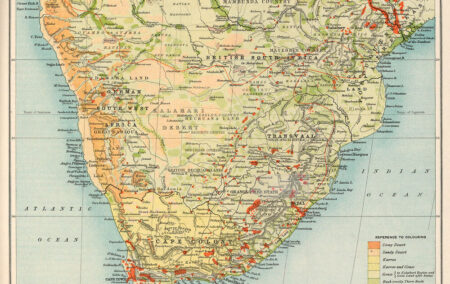It is not uncommon for liberals to feel a sense of hopelessness when witnessing the growing attraction for authoritarian leaders from Donald Trump to Viktor Orban.
In 2021 already Freedom House added a sub-title to their annual Freedom in the World report – Democracy under Siege. In this report Freedom House warned that in the struggle between liberalism and authoritarianism, the gauge may be shifting towards tyranny.
A year later, the New York Times similarly used the phrase Democracy under Siege and pointed out that even the European Parliament considers countries like Hungary and Poland to be electoral autocracies as opposed to fully-fledged democracies. Reflecting on the success of autocrats, the New York Times opined that autocrats have convinced ordinary citizens that unchecked state power allows the state to provide them with greater benefits.
Faustian bargain
Southern Africa’s people have made this trade-off – their individual rights in exchange for public goods for decades. It turned out to be a Faustian bargain.
From the 1970s onwards, the region has witnessed various liberation movements transformed into revolutionary governments wrapped up in Marxist-Leninist rhetoric. The MPLA and FRELIMO came to power in 1975. Five years later Robert Mugabe and his merry band of looters in the form of ZANU found themselves in power. In 1990, SWAPO took over the reins of Namibia and four years later, the ANC was at the helm in South Africa.
These shared much in common – including a healthy disrespect to the tenets of liberal democracy as well as an antagonism towards the business sector. In each of these cases, incumbents saw themselves as revolutionary parties who represented the will of the people. Anyone who opposed the cadres, then must be reactionary and suppressed. The violent logic of this was best exemplified in ZANU-PF’s Zimbabwe where the full force of the states was violently unleashed on the political opposition who dared to electorally challenge the revolutionary party’s grip on the reins of power.
In South Africa, despite the same logic permeating through the ANC as evinced by such concepts as democratic centralism and the National Democratic Revolution, the constraints emanating from our negotiated transition to democracy, the fierce independence of the judiciary, our vibrant media, and civic culture prevented the ANC from attempting to centralise power to the same extent as was happening amongst neighbouring states.
Whilst initially very popular, citizens grew increasingly disenchanted with their rule. Citizens found the truism of George Orwell’s words in Animal Farm that in this socialist nirvana – “All animals are equal, but some animals are more equal than others”.
Penury
Whilst elites enriched themselves, penury was the lot of the majority. 42% of the population live in extreme poverty in Zimbabwe. For Angola, Namibia, and Mozambique the figures are 32%, 41%, and 65% respectively. Given the youthful demographic profiles of these countries, it is young people who have been most affected by poverty.
Moreover, these young people have not experienced the excesses of Portuguese colonialism, apartheid, or Ian Smith. They have only experienced the predatory and repressive rule of ZANU-PF, FRELIMO, the MPLA, and the gross incompetence of the ANC. It is therefore the youth more than any other group in society who understand the false promise of socialist thinking and the grinding poverty which emanates from it.
Unsurprisingly, it is the youth who have taken to the streets, mobilizing against their authoritarian political elites. In Joao Lourenco’s Angola, the ruling MPLA adopted far more repressive tactics against demonstrators. According to Amnesty International dozens have been killed (including children), scores have been detained and numerous laws enacted to suppress freedom of speech and assembly whilst the media is muzzled.
Taking a leaf out of Lourenco’s book, FRELIMO has embarked on the vicious suppression of the political opposition and civil society following the 9 October president elections which pitted FRELIMO’s Daniel Chapo against PODEMOS’s Venancio Mondlane.
Whilst the National Election Commission, stacked with FRELIMO loyalists, declared FRELIMO the victor. However local and foreign observers noted electoral irregularities and fraud. Moreover, a partial parallel count conducted suggest that PODEMOS was the victor. FRELIMO, however, was having none of it. Elvino Dias, Mondlane’s lawyer, who was filing a legal challenge to the election results was murdered by unknown gunmen. So too was a parliamentary candidate for PODEMOS, Paulo Guambe. Protests has since engulfed the impoverished southern African nation triggering an even more violent crackdown.
Dwindling support for SWAPO
As I was penning this article, Namibians were voting, with polls suggesting support for SWAPO is dwindling on the basis of gross mismanagement of the economy, resultant unemployment, and fraud.
Namibia, however, does not have to go the way of the other two Lusophone countries in the region. Two years ago, Cyril Ramaphosa saw the writing on the wall. On the 10 February 2022, in his State of the Nation Address, President Ramaphosa made an important admission, “We all know that government does not create jobs. Business creates jobs. Around 80% of all people employed in South Africa are employed in the private sector”.
Much as this admission made ANC members uncomfortable, this was South Africa’s liberal moment. The 2024 elections merely consolidated this moment when the ANC lost it majority and was compelled forge a Government of National Unity with pro-business political parties.
Should the GNU succeed, should our embattled liberal democracy triumph within our borders, Pretoria could once again serve as a beacon of hope for our troubled region by making common cause with liberal democratic political parties and thereby seek to realize the dream of that old ANC slogan, “A Better Life for All” in our region.
The views of the writer are not necessarily the views of the Daily Friend or the IRR.
If you like what you have just read, support the Daily Friend

